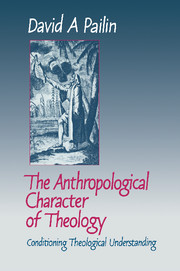Book contents
- Frontmatter
- Contents
- Preface
- 1 INTRODUCTION TO A STUDY OF THEOLOGY
- 2 FAITH, BELIEF, THEOLOGY AND REASON
- 3 GOD AS COSMIC PROJECTION
- 4 GOD AS ACTUALIZING REGULATIVE IDEAS
- 5 THEOLOGY AND RELIGIOUS EXPERIENCE
- 6 THEOLOGY AND THE APPREHENSION OF REVELATION
- 7 THEOLOGY AND HUMAN NEED
- 8 THEOLOGY AND THE COMPLETION OF UNDERSTANDING
- 9 CONCLUSION
- Notes
- Select bibliography
- Index
1 - INTRODUCTION TO A STUDY OF THEOLOGY
Published online by Cambridge University Press: 26 August 2009
- Frontmatter
- Contents
- Preface
- 1 INTRODUCTION TO A STUDY OF THEOLOGY
- 2 FAITH, BELIEF, THEOLOGY AND REASON
- 3 GOD AS COSMIC PROJECTION
- 4 GOD AS ACTUALIZING REGULATIVE IDEAS
- 5 THEOLOGY AND RELIGIOUS EXPERIENCE
- 6 THEOLOGY AND THE APPREHENSION OF REVELATION
- 7 THEOLOGY AND HUMAN NEED
- 8 THEOLOGY AND THE COMPLETION OF UNDERSTANDING
- 9 CONCLUSION
- Notes
- Select bibliography
- Index
Summary
Towards the end of the Critique of Pure Reason, Kant claims that he has provided a much needed assessment of ‘our adventurous and self-reliant reason’, which should help ‘to prevent errors in its use’ and thereby to secure ‘general order and harmony’ in human thought. So far as religion is concerned, his argument shows how metaphysics acts as ‘a bulwark’ for faith by defining the limits of human reason. Whatever judgements may be made on Kant's own performance of this task, it is only by a self-critical investigation of the nature of its rationality that we can appreciate properly the nature and significance of theological understanding.
While, therefore, methodological investigations into a form of understanding may sometimes seem to be a way of avoiding the task of developing that understanding, they may also be a necessary preliminary if such development is to avoid pursuing illusory objectives by specious methods. The following study arises from the conviction that theology today needs such preliminary investigations if it is to establish its credibility as a mode of understanding. In particular, it considers what follows once we recognize that since theologians are human, their conclusions are conditioned by the nature of human thought.
The scope of this study
Presupposing that theological understanding has not dropped from the skies nor been implanted in human minds by the miraculous provision of some deus ex machina, the following chapters investigate various ways in which theological conclusions are affected by the rationality of those who produce them.
- Type
- Chapter
- Information
- The Anthropological Character of TheologyConditioning Theological Understanding, pp. 1 - 7Publisher: Cambridge University PressPrint publication year: 1990



